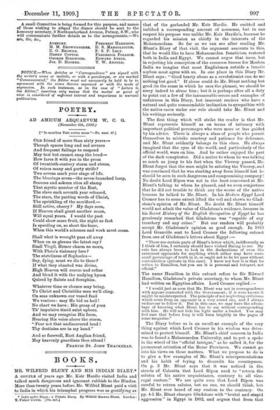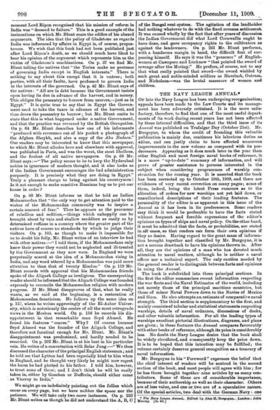1300 K S.
MR. WILFRID BLUNT AND HIS INDIAN DIARY.* A COUPLE of years ago Mr. Keir Hardie visited India and talked much dangerous and ignorant rubbish to the Hindus.
• More than twenty years before Mr. Wilfrid Blunt paid a visit • to India in which his triumphal progress was as gratifying as - a radio. under Ripon: a Private Diary. By-Wilfrid Scawen Blunt. London : T. Fisher Unwin. [10s. net.]
that of the garlanded Mr. ICeir Hardie. He emitted and imbibed a corresponding amount of nonsense, but in one respect his purpose was unlike Mr. Keir Harclies, because he regarded his mission as chiefly in the interests of the Mohammedans. So far as we can see after reading Mr. Blunt's Diary of that visit, the argument amounts to this, that he would like to have Mohammedan fanaticism restored both in India and Egypt. We cannot argue that issue, but in rejecting his conception of the summum bonum for Moslem India we imagine that most Englishmen outside a lunatic asylum must agree with us. In one place in this Diary Mr. Blunt says : "Good hearty abuse as a revolutionist can do me nothing but good." If abuse could do Mr. Blunt nothing but good (in the sense in which he uses the phrase), we should be sorry indeed to abuse him; but it is perhaps after all a duty to point out a few of the innumerable errors and examples of unfairness in this Diary, lest innocent readers who have a natural and quite commendable inclination to sympathise with the native races under our rule should take Mr. Blunt and his writings seriously.
The first thing which will strike the reader is that Mr. Blunt represents himself as on terms of intimacy with important political personages who were more or less guided by his advice. There is always a class of people who permit themselves to mistake courtesy and patience for deference, and Mr. Blunt evidently belongs to this class. He always imagined that the eyes of the world, and particularly of the official world, were on him. And he rather enjoyed the part of the dark conspirator. Did a native to whom he was talking so much as jump to his feet when the Viceroy passed, Mr. Blunt forgot that the man might be saluting the Viceroy, and was convinced that he was starting away from himself lest be should be seen in such dangerous and compromising company ! No doubt Lord Ripon was not in the least concerned at Mr.
Blunt's talking to whom he pleased, and we even conjecture that he did not trouble to think any the worse of the native because he talked to Mr. Blunt. In his Modern Egypt Lord Cromer has to some extent lifted the veil and shown us Glad- stone's opinion of Mr. Blunt. No doubt Mr. Blunt himself
would not admit the value of Gladstone's evidence, because in his Secret History of the English Occupation of Egypt he has graciously remarked that Gladstone was "capable of any treachery and any crime." But our readers will probably accept Mr. Gladstone's opinion as good enough. In 1883
Lord Granville sent to Lord Cromer the following extract from one of Gladstone's lettere about Egypt :—
" There are certain parts of Blunt's letter which, indifferently as I think of him, I certainly should have wished Baring to see. My rule has always been to look in the declarations of even the extremest opponents for anything which either may have some small percentage of truth in it, or ought not to be let pass without contradiction (private in this case). I know not how it is that he writes to Hamilton, but you see it is personal and tutoyant, not official."
The name Hamilton in this extract refers to Sir Edward Hamilton, Gladstone's private secretary, to whom Mr. Blunt had written on Egyptian affairs. Lord Cromer replied :—
"I would just as soon that Mr. Blunt was not in correspondence with anyone connected with the Government; if it were known it might be misinterpreted. The principle of not neglecting criticisms which come from an opponent is a very sound ono, and I always endeavour to follow it. But in this case, we may have the advan- tage of knowing what Blunt has to say without corresponding with him. He will not hide his light under a bushel. You may feel sure that before long it will burn brightly in the pages of some magazine."
The Diary before us is an excellent example of the very thing against which Lord Cromer in his wisdom was deter-
mined to protect himself. Mr. Blunt's chief concern in India was to found a Mohammedan University, and to put a spoke in the wheel of the "official intrigue," as be called it, for the permanent retention of the Berar Provinces. We cannot go into his views on these matters. What we propose to do- is to give a few examples of Mr. Blunt's misrepresentations and his habit of trying to discredit his countrymen. On p. 3 Mr. Blunt says that it was noticed in the streets of Calcutta that Lord •Ripon used to "return the salutes of his native acquaintance, contrary to all vice- regal custom." We are quite sure that Lord Ripon was careful to retUrn salutes, but no one, we should think, but Mr. Blunt ever heard of any custom to the contrary. On pp. 4-5 Mr, Blunt charges Gladstone with "brutal and stupid aggression" in Egypt in 1882, and argues that from that
moment Lord Ripon recognised that his mission of -reform in India was "doomed to failure." This is a good. example of the insinuations on which Mr. Blunt rears the edifice of his absurd arguments. The idea that the policy of Gladstone as regards India was influenced by affairs in Egypt is, of course, prepos- terous. We wish that this book had not been published just after Lord Ripon's death, as we should much have liked to hear his opinion of the argument which represents him as the victim of Gladstone's machinations. On p. 37 we find Mr. Blunt telling the natives that" the Tories make no pretence of governing India except in English interests." There is nothing to say about this except that it is untrue; both parties, with all their faults, have professed to govern India in the interests of the governed. On p. 42 Mr. Blunt says of the natives : "All are in debt because the Government insists upon having its due in advance of the harvest, and in money. This obliges the peasantry to borrow from usurers,—just as in Egypt." It is quite true to say that in Egypt the Govern- ment used to take the taxes in advance of the harvest, and thus drove the peasantry to borrow ; but Mr. Blunt omits to state that this is what happened under a native Government, and that the practice was reversed by the British Occupation. On p. 64 Mr. Blunt describes how one of his informants " produced with reverence out of his pocket a photograph of the Afghan Sheykh, and also a copy of the Abu Nadara." Our readers may be interested to know that this newspaper, to which Mr. Blunt alludes here and elsewhere with approval, was published in Paris, and was the worst, the most libellous, and the foulest of all native newspapers. On p. 68 Mr. Blunt says :—" The policy seems to be to keep the Hyderabad nobles in ignorance of modern thought, and it also looks as if the Indian Government encourages the bad administration purposely. It is precisely what they are doing in Egypt." Truly a pleasant charge to bring against his countrymen ! Is it not enough to make sensitive Russians beg us to put our house in order ?
On p. 88 Mr. Blunt informs us that he told an Indian Mohammedan that "the only way to get attention paid to the wishes of the Mohammedan community was to inspire a certain amount of fear." Thus he appears as the precursor of rebellion and sedition,—things which unhappily can be brought about by vain and shallow meddlers as easily as by determined ruffians in a country where the greater part of the natives have of course no standards by which to judge their visitors. On p. 103, as though to make it impossible for us to doubt his folly, Mr. Blunt writes of an interview he had with other natives :—" I told them, if the Mohammedans only knew their power they would not be neglected and ill-treated by the Government as they now were. In England we were perpetually scared at the idea of a Mohammedan rising in India, and any word uttered by a Mohammedan was paid more attention to than that. of twenty Hindus." On p. 119 Mr. Blunt records with approval that his Mohammedan friends spoke of the Aligarh College as irreligions. The unsuspecting reader should be informed that the Aligarh College was founded expressly to reconcile the Mohammedan religion with modern progress. If Mr. Blunt disapproves of that, what he really wants, as we said at the beginning, is a restoration of Mohammedan fanaticism. He follows up the same idea on p. 121, where he writes approvingly of the El-Azhar Univer- sity, which is notoriously the centre of all the most retrograde views in the Moslem world. On p. 156 he records his dis- appointment in that remarkable man Seyd Ahmed. He found his features "coarse." Why p Of course because Seyd Ahmed was the founder of the Aligarh College, and therefore not fanatical enough for Mr. Blunt. Mr. Blunt's disappointment was predestined, and hardly needed to be recorded. On p. 202 Mr. Blunt is at his best in his particular vein. He writes of a conveesation with Saler Jung :—" We then discussed the character of the principal English statesmen ; and he told me that Lytton had been especially kind to him when in England, and he thought very likely he might now regret the harm be had plotted to his father. I told him, however, to trust none of them; and I don't think he will be easily taken in, either by Goschen or Dufferin, should either come as Viceroy to India.,"
We might go on indefinitely painting out the follies which occur on every page, but we have neither the space nor the patience. We will take only two more instances. On p. 253 Mr. Blunt writes aa though he did not understand the A, B, C
of the Bengal rent system. The agitation of the landholder had nothing whatever to do with the fixed revenue settlement. It was caused wholly by the fact that after years of discussion the Indian Government did what Lord Cornwallis ought to have done, and gave occupancy rights to the cultivators as against the landowners. On p. 261 Mr. Blunt performs, with a handsome margin in hand, the difficult feat of sur- passing himself. He says it was the "presence" of English- women at Cawnpore and Luchnow "that pointed the sword of revenge after the Mutiny." He prefers, of course, not to say that what really pointed that sword—the sword wielded by such great and noble-minded, soldiers as Havelock, Outram, and Nicholson—was the brutal massacre of women and children.

























































 Previous page
Previous page